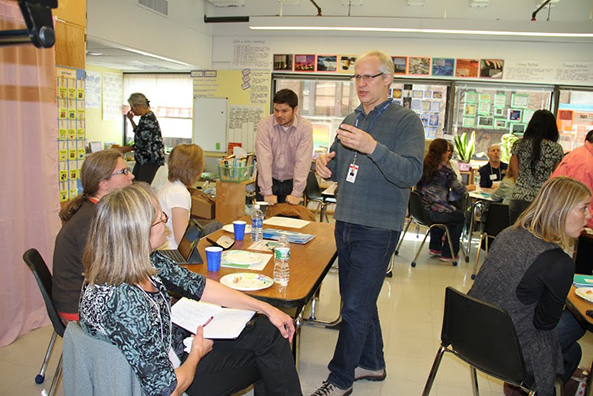The future of progressive education relies heavily on collaboration between teachers, administrators, and school personnel who believe strongly in the power of the practice. In order to facilitate the sharing of ideas, best practices, and experiences among these individuals, the Progressive Education Network hosts national conferences and supports regional gatherings for progressive educators. This year, the 2015 PEN Conference was held in New York City, which gave Bank Street the opportunity to share its approach to progressive pedagogy while learning from fellow progressive educators from a range of schools and districts throughout the United States.
 The Bank Street School for Children was one of 35 progressive independent, public, and charter schools in New York City to organize a site visit for conference participants. Led by Ronnie Sampson, admissions assistant for the School for Children, a group of around ten educators spent an entire morning weaving in and out of classrooms as flies on the wall, getting to experience firsthand the inner workings of the Bank Street learning community. After the tour, they enjoyed lunch with SFC administrators, commenting on their observations from the morning and raising questions surrounding Bank Street’s model: How do you incorporate math and literacy in the lower grades? When did you start training educators on how to teach racism? How do you explain gender identity? What types of teacher teams exist at each level?
The Bank Street School for Children was one of 35 progressive independent, public, and charter schools in New York City to organize a site visit for conference participants. Led by Ronnie Sampson, admissions assistant for the School for Children, a group of around ten educators spent an entire morning weaving in and out of classrooms as flies on the wall, getting to experience firsthand the inner workings of the Bank Street learning community. After the tour, they enjoyed lunch with SFC administrators, commenting on their observations from the morning and raising questions surrounding Bank Street’s model: How do you incorporate math and literacy in the lower grades? When did you start training educators on how to teach racism? How do you explain gender identity? What types of teacher teams exist at each level?
In addition to hosting a site visit, Bank Street faculty and staff conducted workshops that encouraged educators to reflect on their practices, grow their understanding of progressive education, and engage with the conference theme: Access, Equity, & Activism: Teaching the Possible. One workshop, titled Access to Progressive Education: Exploring the Possibilities of Inclusion, was led by Margie Brickley, Co-Director of Bank Street’s Infancy Institute, and Gabriel Guyton, Sarah Willis, and Pamela Wheeler-Civita, Head Teachers at the Bank Street Family Center. The session explored the challenges and successes of inclusive education from a social justice perspective. It centered on renowned progressive educator John Dewey’s belief that “every human being, independent of the quantity or range of his personal endowment, has the right to equal opportunity with every other person for the development of whatever gifts he has.”
In another workshop titled Food Justice and Composting, Bank Street School for Children faculty member Morika Tsujimura taught participants ways to bring a “food justice” focus to their schools or organizations, regardless of whether or not they have access to an outdoor growing space. The discussion brought light to an often ignored side of the growing cycle: composting. This unique topic echoes several initiatives currently in motion at the School for Children in preservation and sustainability.
A significant part of Bank Street’s work is not only sharing its approach with others in the progressive sphere but learning from them as well.
“Those of us who attended the conference learned from many other educators,” said Claire Mansfield, Head Teacher at the School for Children. “We continue to learn from others and collaborate with progressive schools. It’s a very important aspect of our work.”
Both Claire and School for Children Coordinator Emily Linsay have spent almost two years working on the planning committee for the conference, which was attended this year by over 800 educators.
“A fundamental element of this conference and its planning is the community of progressive educators in public and private schools around the city and nation,” Emily said. “Bank Street was one part of that. Many of us involved in the planning and who supported the conference intend to continue such networking and professional development opportunities regionally.”